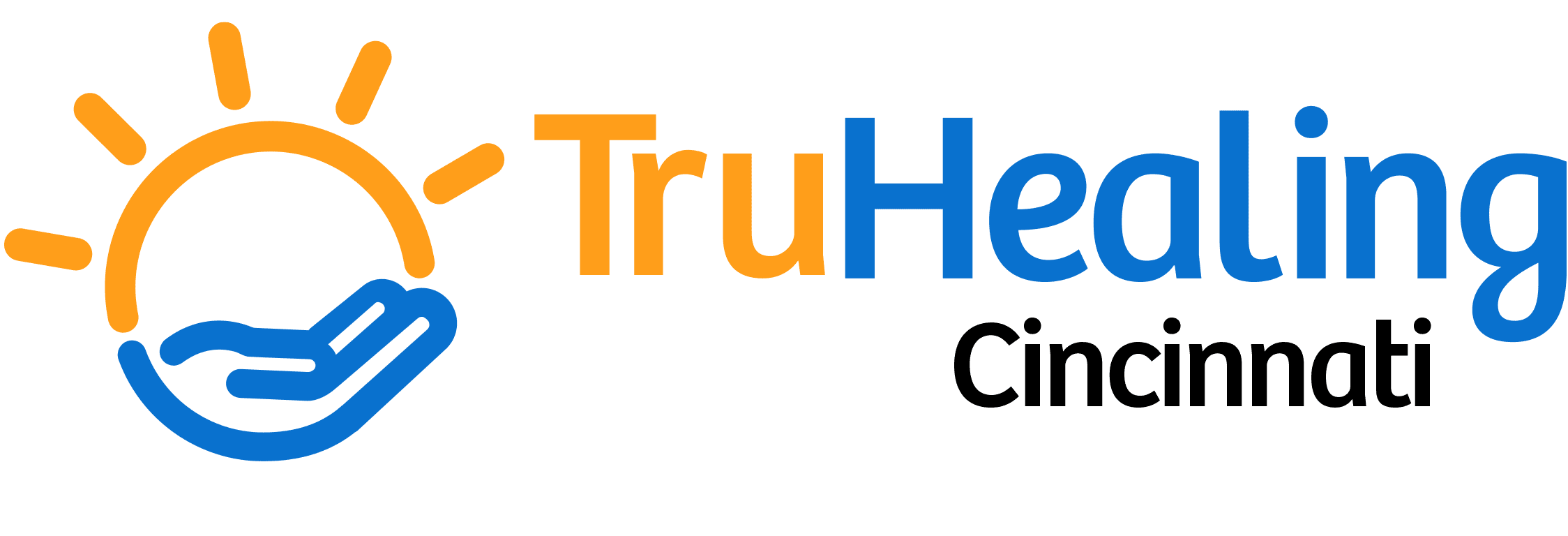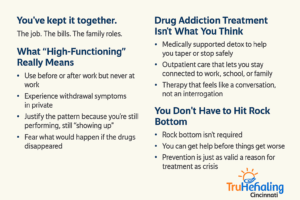You’ve kept it together.
The job. The bills. The family roles.
You’ve met deadlines, handled responsibilities, and maybe even convinced yourself that things aren’t that bad. But deep down, something’s shifted. You’ve started researching. You’ve asked questions in your head you never would’ve admitted a year ago. Questions like:
“How do I know if I need help?”
“Would drug addiction treatment even work for someone like me?”
If you’re reading this, that’s not failure. That’s awareness. And at TruHealing Cincinnati’s addiction treatment center, we believe awareness is a powerful place to begin.
What “High-Functioning” Really Means
Being a high-functioning opiate user means you’ve likely built your life around maintaining appearances while quietly managing a dependency. You may:
- Use before or after work but never at work
- Experience withdrawal symptoms in private
- Justify the pattern because you’re still performing, still “showing up”
- Fear what would happen if the drugs disappeared
To the outside world, nothing looks broken. But inside, you may feel like you’re walking a tightrope—and it’s getting thinner.
Here’s the truth: Functioning doesn’t mean flourishing. Just because your life hasn’t fallen apart doesn’t mean you’re okay.
Drug Addiction Treatment Isn’t What You Think
Many people delay getting help because they think treatment is only for people in crisis or that it’s rigid, extreme, or shame-based. Maybe you picture sterile rehab centers or people shouting about rock bottom in group therapy.
Here’s what we want you to know: quality drug addiction treatment is built around compassion, customization, and respect for where you are now.
Treatment can include:
- Medically supported detox to help you taper or stop safely
- Outpatient care that lets you stay connected to work, school, or family
- Therapy that feels like a conversation, not an interrogation
- Peer support groups that offer honest connection—not forced performance
And yes, you can engage in treatment even if you’re still working, parenting, or managing a full life.
If you’re looking for options outside Cincinnati, you may want to explore:
You Don’t Have to Hit Rock Bottom
This is one of the most harmful myths we see in new clients. That they have to lose everything—or at least something big—before they “qualify” for help.
But rock bottom isn’t required.
You can get help before things get worse.
In fact, people who seek treatment earlier often have smoother recoveries and stronger long-term outcomes.
If you’re feeling scared to reach out because your life still looks functional, consider this: prevention is just as valid a reason for treatment as crisis. Wanting more peace, stability, or freedom in your life is reason enough.
How Do You Know If You’re Ready?
Read this slowly:
You don’t have to feel ready to be ready.
You just have to feel done—done managing, done hiding, done wondering if this will ever get better.
Common signs you might benefit from treatment include:
- Feeling anxious without your next dose
- Thinking about opiates more than you’d like to admit
- Needing higher doses to feel the same relief
- Experiencing shame or isolation around your use
- Telling yourself it’s under control—while secretly worrying it’s not
If any of these feel familiar, you’re not alone. And you don’t have to keep managing this on your own.
What You Can Expect from Treatment
At TruHealing Cincinnati, we start by listening. No pressure, no judgment, no assumptions.
From there, we build a plan with you—not for you.
Your treatment might include:
- Medical Detox: If your body is physically dependent, we offer safe, monitored withdrawal support. You’ll never be left alone or in unnecessary pain.
- Outpatient Treatment: Our flexible programs allow you to attend therapy while maintaining your daily life.
- Therapy and Counseling: We focus on the why—not just the what. Whether you’re dealing with stress, trauma, or just emotional burnout, we meet you there.
- Support Groups: You’ll find others who understand what it means to look “fine” on the outside and feel unwell inside.
Treatment is about giving you space to breathe, reconnect, and figure out what comes next—with support, not shame.
Taking the First Step Isn’t a Commitment
Researching this doesn’t lock you into anything. Calling for a consultation doesn’t mean you’re signing up on the spot. Starting with outpatient doesn’t mean you’re weak or half-in.
Every step counts—even this one.
You’re allowed to move slowly. You’re allowed to have doubts.
But please don’t let fear or pride keep you from asking for the support you deserve.
You’re Already Brave. Now Let Yourself Be Supported.
You’ve carried this silently.
You’ve done everything in your power to manage this alone.
And maybe that worked—for a while.
But if your silence is starting to feel like suffocation, and your control is starting to slip, you don’t have to white-knuckle it anymore.
You’re allowed to ask for help. Not because you’re broken—but because you’re worth saving before you break.
Ready to explore what help could look like?
Call (888) 643-9118 to learn more about our drug addiction treatment services in Cincinnati, Ohio.
Frequently Asked Questions
I’m still working and supporting my family. Can I still be “addicted”?
Yes. Addiction isn’t about how chaotic your life looks—it’s about the role a substance plays in your functioning. If you rely on opiates to get through the day, you’re not weak, but you are likely dependent—and that’s treatable.
What if I’ve never told anyone about my use?
That’s okay. Many people come to us having never spoken a word of their struggle. We’re not here to shame or expose you—we’re here to walk beside you while you learn how to live differently.
What happens if I reach out? Am I committed to treatment?
Not at all. An initial call or visit is about understanding your options. We’ll answer your questions, explain what care might look like, and help you decide what makes sense for your life.
Do I have to go to inpatient rehab?
Not necessarily. Many high-functioning clients start with outpatient treatment. This allows you to remain at home while attending therapy and support groups. We’ll recommend what’s safest and most effective, but the final decision is yours.
How do I talk to my family or employer about this?
You don’t have to navigate this alone. We can help you with language, timing, and support around disclosure—if and when you’re ready. In many cases, clients can begin care privately while continuing their current routines.


